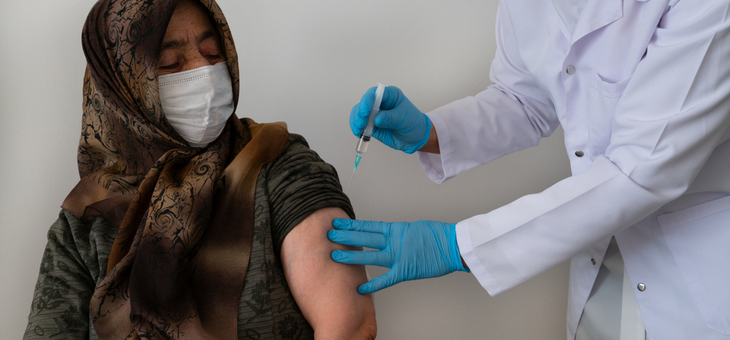Nearly three quarters of Australians would accept a mandatory COVID-19 vaccination for work, study and travel, despite only 66 per cent saying they would receive a vaccine voluntarily.
Research from the Universities of Sydney and Western Australia has found:
- 73 per cent of Australians agree the government should require a COVID-19 vaccine for work, travel and study (mandated vaccines)
- 66 per cent of Australians would receive a COVID vaccine voluntarily
- 25 per cent of Australians are unsure about taking it. Of those, 70 per cent expressed safety concerns about the vaccines being developed so quickly
- 9 per cent of Australians would not take a COVID-19 vaccine
- the elderly and more affluent were also more likely to say yes to a vaccine.
Read more: What to do after your vaccination
Mandatory vaccination is where vaccination is required for people undertaking particular activities. Compulsory vaccination would require everyone to be vaccinated.
Associate Professor David Smith, lead author of the study, said the research was consistent with Australians embracing measures such as lockdowns and curfews. “You don’t see this acceptance in other countries, especially the US,” he said. “The compliance with strict rules is one of the reasons Australia hasn’t suffered as much.”
Government mandate measures to motivate vaccine uptake could include taxes and incentives, denial of access to public or private institutions, border entry or re-entry or forced and unfunded hotel quarantine for travellers, and vaccine passports.
Read more: Investigating vaccine side-effects
However, Nine has highlighted difficulties with a vaccine passport system, reporting that six people had tested positive for COVID-19 in hotel quarantine in the past three weeks despite being fully vaccinated overseas.
University of Sydney epidemiologist Dr Fiona Stanaway said because most Australians were not vaccinated, there was a risk of a mass outbreak, so people still needed to do hotel quarantine.
Leaks from Australian quarantine hotels are suspected to be a result of airborne spread. On Saturday, James McCaw, an epidemiologist and mathematical biologist with the University of Melbourne, said it was “absolutely inevitable” that “continued escapes from quarantine” would occur every month.
As a result, he said “the risk of a disastrous coronavirus outbreak in Australia is now at its highest level since the pandemic began”.
The World Health Organization (WHO) has belatedly updated its advice on the airborne transmission risk of COVID-19, leading to calls for Australian officials to update national air quality guidelines.
The WHO guidance emphasises “the threat of small airborne virus particles that linger in the air and can travel in poorly ventilated spaces”.
Australian Institute of Occupational Hygienists president Kate Cole said the focus on cleaning surfaces ahead of air quality “needs to be reversed”.
“It’s not to say that we need to get rid of all the other (precautions) we have in place. It’s just recognising that COVID transmits from person to person in a number of ways,” Ms Cole said.
“So, you could be washing your hands until the cows come home, and you could still get COVID-19, because you’ve shared contaminated air.”
Updated US advice lists “breathing in air when close to an infected person who is exhaling small droplets and particles that contain the virus” as the first of three ways the virus spreads.
It means the most common way to be infected is to breathe in small droplets or particles from an infected person who is standing within two metres or having small droplets and particles land on the eyes, nose or mouth, especially from cough and sneezes.
Ventilation expert and University of Adelaide academic Professor Geoff Hanmer wants to see Australia’s National Construction Code (NCC) changed to reflect the evidence of aerosol transmission. Prof. Hanmer is part of the International Code Council’s pandemic task force which is considering how building design can reduce the spread of disease.
“The biggest technical change that needs to be made is the way that we deal with naturally ventilated buildings. That’s most aged care facilities or schools,” he said.
“When people shut the windows because it’s cold outside, there’s no ventilation. And the level of ventilation reaches hazardous levels quite quickly.”
The chair of epidemiology at Deakin University, Professor Catherine Bennett, said aerosol transmission was evident and action was needed.
“We’ve seen evidence from particular events, like our own hotel quarantine, where everything else is controlled, so we know we’re not getting that direct person-to-person contact,” she said.
“And yet we still saw cases where the only explanation is that there is enough virus that’s staying suspended in the air for just long enough, for someone to walk in and pick it up.”
Is ventilation on your radar as we close in on winter and shut more doors and windows? Have you kept up the practice of washing your hands regularly? Do you support mandatory vaccinations?
Read more: What is vaccine shedding?
If you enjoy our content, don’t keep it to yourself. Share our free eNews with your friends and encourage them to sign up.

